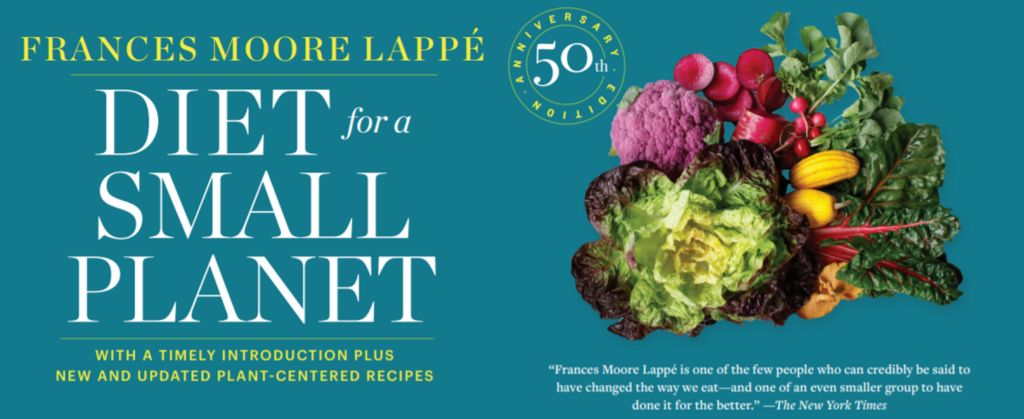Fifty years ago, Frances Moore Lappé wrote and published her first book “Diet for a Small Planet,” which exposed the needless ways a meat-centric diet caused and contributed to waste.
Since then, Frances has authored and co-authored nineteen more books that center on a “living democracy”—a democracy based on a wide dispersion of power, great transparency, and a culture of mutual accountability. She is also the cofounder of Food First and the Small Planet Institute, and co-founded the Small Planet Fund with her daughter, activist, and author Anna Lappé.
Frances has been a staunch supporter of Corporate Accountability for many years. And to celebrate the 50th anniversary of “Diet for a Small Planet,” we sat down with Frances to talk about her work and discuss how her vision for justice has evolved over the last five decades.
What inspired you to write Diet for a Small Planet?
Fifty years ago, I was working in Philadelphia as organizer for city as part of Lyndon Johnson’s “war on poverty.” I went door-to-door in very poor neighborhoods, organizing welfare recipients and helping them access their rights. After my closest friend in the group died of a heart attack I had to dig deeper. I felt she really died of the stress of poverty and I had to dig deeper to get to the roots of needless poverty. At the time, the pervasive idea surrounding social justice was that there was a scarcity of resources. I learned pretty quickly that there was in fact enough food to go around but many people weren’t getting access to it. It became quite clear to me that the issues centered around questions of power and democracy, not resource limitations.
Diet for a Small Planet touches on concepts such as hunger, food waste, and the corporatization of our food system. What are some ways that your thinking on these issues have evolved since you first wrote the book 50 years ago?
Over the years, I’ve slowly expanded my understanding about food. I think of what I advocate as plant-and-planet-centered diets in the transition to sustainability. Basically, it’s not enough to just eat a plant-based diet – we still need to pay attention to how food and crops are grown, so that agriculture doesn’t lead to species decimation and great reductions in biodiversity—as it does today.
The “tap root” crisis, I realized is democracy itself—how we make decisions together. Right now, corporations and the wealthiest among us have outsized power, violating democracy. I really believe that democracy must be reframed as having both a political and an economic dimension. In the U.S., economic inequality is more extreme than in over 100 countries, according to the World Bank. The concentration of power that we’ve allowed to accumulate over the decades has infected and distorted our elected representatives’ abilities to govern and make decisions in that “promote the general welfare,” as our constitution’s preamble calls for. It’s become very clear that we can’t have a true political democracy unless it is also grounded in equity.

In your book, you call yourself a “possibilist.” What does it mean to embody an appetite for possibility and how do we center possibility in organizing work?
Throughout the course of history, humankind has proven that we don’t need certainty to act if we believe that something is important enough for us to want to change. This is the key to the idea of being possibilist. I want to show people that the way our world is structured right now is not the way it has to be. For example, when we think of our planet, we don’t need to be absolutely certain of what awaits us on the other side, if we want to turn things around and prevent the worst of climate catastrophe. All we have to do is believe that we can make a difference–that we can save each other and improve our living conditions–together.
How would you like to see the system reset in the next several years?
Right now, there are monopolies in every single industry. I want to expose the myth that ours is a “competitive” economy. A free market doesn’t exist! And we can’t have corporate accountability unless there are rules that counter these monopolies.
I love the work that Corporate Accountability does to highlight and call out the impact of private wealth and wealth abuse is vital in helping people understand the crises that we are living through. All of life exists in connection. “There are no parts, only participants,” a wise friend once said to me. Economic and political democracy are inseparable. We can’t achieve equity and empowerment so long as we have a political democracy that lies in the pockets of private interests. As long as candidates are funded by private donors, the system will always benefit the ultra-wealthy and corporations.







